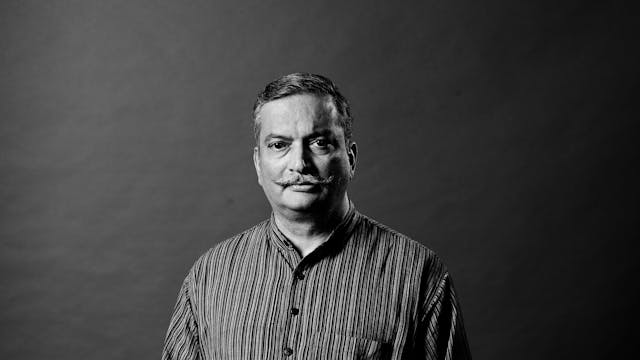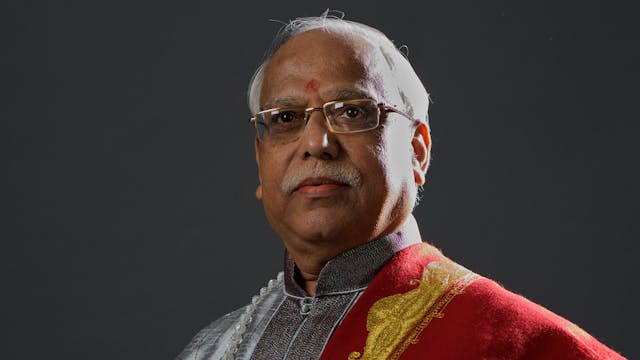Niladri Kumar | Interview
Interviews
•
14m
Recorded on Darbar Festival 2014, on 19th September, at the Level 5 Function Room of the Royal Festival Hall, at London's Southbank Centre.
Musicians:
- Niladri Kumar (sitar and zitar)
- Soumik Datta (host)
Rooted in the rich tradition of the Maihar gharana, Niladri Kumar has learned sitar under his father, Pandit Kartick Kumar, one of the senior-most disciples of Pandit Ravi Shankar. A renowned exponent of the sitar and surbhahar, Pandit Kartick Kumar has straddled Indian classical and Bollywood music with equal flair.
As a young student of music, Niladri Kumar was surrounded by the rich environment of Indian classical music at home. In stark contrast, he stepped out into a world where his peers were more enamoured by rock music or the sound of a western guitar. They showed no interest in his art and some didn’t even know that Indian classical music exists.
This interview projects how these contradictory worlds have shaped Kumar’s extraordinary music, personality and creativity. In a candid conversation, he reveals how these cross-currents of acceptance and rejection have been the birthplace of his music.
Kumar has followed in his father’s footsteps, but on a canvas much larger and varied. He plays pure classical, Bollywood and has given a new dimension to the sitar with fusion music. He works regularly with the biggest names like Shankar-Ehsan-Loy, A.R. Rahman, Pritam, Louis Banks, Trilok Gurtu, John McLaughlin, Ustad Zakir Hussain et al. While he can draw ten thousand listeners with a pure classical solo at the Sawai Gandharva music festival in India, some of the biggest chartbusters in Bollywood resonate with the sound of his ‘zitar’, an electrified, five-stringed version of the sitar that he had developed for his cross-over projects.
Kumar has often played to the galleries and shaken the establishment with his mind-bending and funky experimentations with the sitar. While purists may have taken time to accept him, one cannot deny his contributions to the instrument. Kumar has taken sound of the sitar to large sections of non-listeners by changing the format and language of the instrument. He has garnered a huge followership and has converted many of them into listeners of Indian classical music.
He is the first Indian to make it to the Seymour-Duncan's artist endorsee list that features Slash, Mik Thompson and Tom Hamilton et al. He has been chosen as an ambassador to endorse the Taj Tea, a popular Indian brand.
“If I have created a sound of which only I am the exponent, then it is not a style. You may call it a style if others imbibe and imitate it. Whether there is a ‘Niladri sound’ or not is something only time will tell.”
With an open-ended answer, he shrugs off all suggestions or accolades of a signature sound or style that he may have created on his sitar over the years. And yet, a listener can distinctly recognise his meends (gliding notes) even with closed eyes. One of Kumar’s remarkable traits is his ability to suspend a cluster of notes mid-air using only one string and keep them lingering over there for a mesmerising period of time by merely pulling that string.
In his own words, Kumar did not wake up one fine day and decide to be “different”. He did what he already knew, combining his own resources with elements imbibed from his favourite sarod players, sitar players and even guitar players and drummers. Remaining rooted in Indian classical music, he has branched out and created new terrains in fusion music with the sitar. Through his unique sound and quirk, Kumar has created a space in his music where people of all generations and mindsets can converge, tune in and find a common ground.
This interview was recorded during his trip to perform at the Darbar Festival 2014 in London.
Up Next in Interviews
-
Pandit Nityanand Haldipur | Interview
Recorded at Darbar Festival 2014, at London's Southbank Centre.
Interviewee:
- Pandit Nityanand HaldipurThe journey of the humble bamboo flute from folk music to Indian classical music is not a very old one. The transformation took place due to the pioneering efforts of Pandit Pannalal Ghosh (...
-
Pandit Vinayak Torvi | Interview
In a lively conversation recorded in 2014, Pandit Torvi gives some age-old insights about the values of Indian music and musicians that still have strong relevance today.
Musicians:
- Pandit Vinayak Torvi (Gwalior and Kirana gharanas)Keen observation is one of the key tools to learning an art ...


